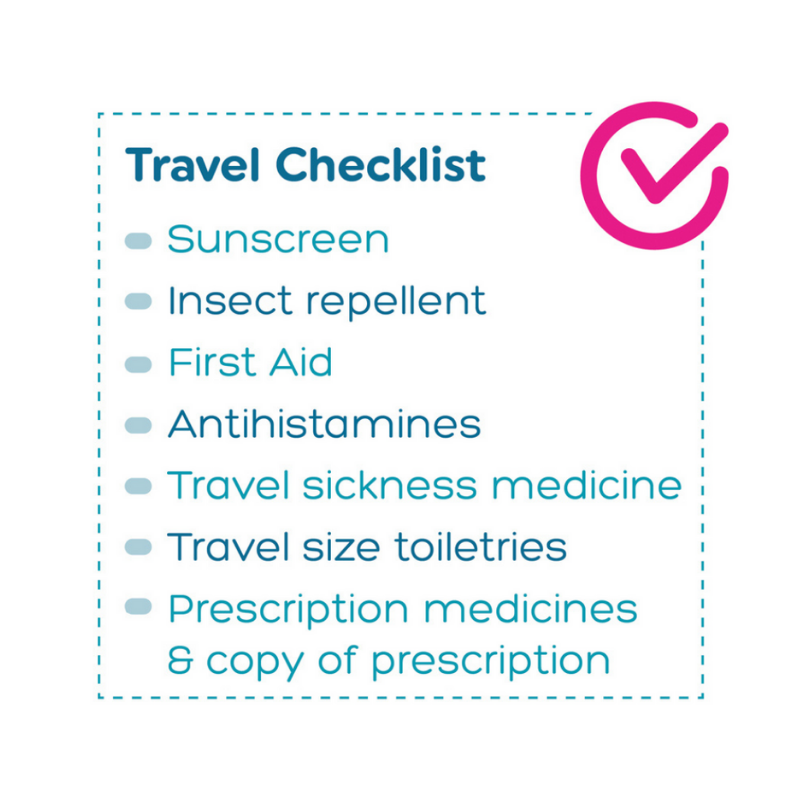Travel Essentials
Start planning a few weeks before travelling and first things first, ensure your passport is in date. If you are travelling outside of the EU you may require a VISA to enter the country. The DFA website DFA.ie provides information on VISA requirements and other helpful information. Run through the below and ask yourself the following questions to get prepared!
What to prepare before you go:
How should I plan for COVID-19 restrictions?
- The DFA Website details what vaccination and COVID-19 testing requirements are necessary, if any.
- Ensure you meet the entry requirements and regulations to the country you are visiting prior to making travel arrangements
How do I know if I need any travel vaccinations?
- For destinations such as Asia, you will need to plan 6-8 weeks ahead of time as some courses of vaccinations and medications can take several weeks to complete, ensuring you have adequate protection
- The fitfortravel website is an excellent resource for country-specific medical advice
What do I need to do about my regular medication?
- If you take any medicines regularly, make sure you have enough for your trip and check with your airline about what you can carry in your hand luggage
- Be aware that some medicines may not be permitted in your destination country
Do I need insurance?
- Take out medical insurance before you travel abroad
- Make sure you declare any existing health issues
- If you are travelling within the EU, apply for a European Health Insurance Card (EHIC). This card may entitle you to free emergency medical care within any EU country. This card may entitle you to free emergency medical care within any EU country. For more information visit HSE
How to stay safe when on holiday:
How can I reduce food risks?
Travellers’ Diarrhoea is the most common illness when travelling. Contaminated food and drinking water are common causes.
- Always wash your hands before eating or preparing food.
- If you get diarrhoea, drink plenty of fluids to stay hydrated
- There are medicines available for treating diarrhoea, you can speak to your pharmacist about these
- Taking a probiotic such as Optibac for travellers can be useful to support your natural immunity and prevent illness
What about water?
In some countries, water cause travellers’ diarrhoea.
- Unless you know a water supply is safe, only use bottled water, provided in sealed, tamper-proof containers, or, use boiled or sterilised water (even for cleaning your teeth)
- Freezing does not sterilise water, so avoid drinks with ice cubes also!
How can I stay safe in the sun?
- Avoid direct sunshine between 11am-3pm
- Use high factor SPF sunscreen and reapply regularly
- Wear protective clothing. This is particularly important for babies & children
- Drink plenty of fluids and be aware that alcohol can make you dehydrated
How can I avoid getting insect bites?
- Use insect repellent daily. DEET containing formulations are the most effective
- Close room shutter screens early in the evening and spray rooms with insect repellent if needed
- Don’t camp near stagnant water. This is a common breeding area for mosquitoes
- Take extra precautions if trekking in the countryside, jungle, etc.
What do I do if I get an insect bite?
- Keep bites clean - this reduces the likelihood of infection
- Antihistamine tablets can relieve the itch and swelling of bites but they will not prevent bites or protect you from any insect-borne disease
- You can get a bite relief product at your local Allcare
- Seek medical advice if there is worsening redness, pain, fever, a large reaction or prolonged healing
Pop into your local Allcare or online here to pick up all your travel essentials.
Handy Travel Checklist



